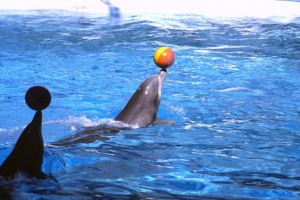 An IPSOS survey has revealed that 96% of Italians want to see an end to the keeping of dolphins in captivity, with 81% admitting that they believe dolphins to be ‘happier’ in the wild.
An IPSOS survey has revealed that 96% of Italians want to see an end to the keeping of dolphins in captivity, with 81% admitting that they believe dolphins to be ‘happier’ in the wild.
Italian animal protection NGOs, LAV (ENDCAP member) and Marevivo have today, the 4th July – ‘World Day opposing the captivity of dolphins’, launched a campaign to end the exploitation of dolphins in captivity in Italy.
“In Italy, the dolphins in captivity provide no benefit to public education or species conservation, the key requirements of the Italian and European zoo law, instead they are forced to perform demeaning tricks to music and are housed in unnatural, cramped conditions to provide ‘entertainment’,” said LAV and Marevivo. “This exploitation of these highly intelligent animals must end.”
LAV and Marevivo will present their investigation of Italian dophinaria to the Minister of the Environment, Andrea Orlando, asking him to investigate the identified violations with Italian law.
LAV and Marevivo have joined a growing number of European NGOs to call for an end to the keeping of dolphins and whales (collectively known as cetaceans) in captivity. Focusing on the effects that captivity imposes on the welfare and survival of the dolphins, the consortium of NGOs has launched the public-focus campaign film, SOS DOLPHINS, to raise greater awareness and call for a phasing-out of the industry across the European Union.
In the EU there are a total of 33 dolphinaria, displaying a reported 290 cetaceans of six different species. Spain has the largest number, with 11 dolphinaria, whilst Italy has a total of 5 dolphinaria keeping 24 bottlenose dolphins and one Risso’s dolphin.
For news on the Spanish campaign and to view the SOS Dolphins film:
To view the Italian version here: http://www.youtube.com/watch?v=Zf20f3-Q-24&feature=youtu.be.
Further information:
- The SOS DOLPHINS campaign was initially established in Spain by the NGO, FAADA, but is now supported by the Born Free Foundation (UK), ANDA (Spain), Anima Naturalis (Spain), One Voice (France), LAV (Italy), Marevivo (Italy), Oceancare (Switzerland) and the European coalition, ENDCAP;
- The IPSOS Public Poll was commissioned by French NGO, One Voice. It has revealed that the public across the EU are questioning the future of the captive dolphin industry;
- Thirteen EU Member States (Austria, Croatia, Cyprus, Czech Republic, Estonia, Hungary, Latvia, Luxembourg, Poland, Republic of Ireland, Slovakia, Slovenia and the United Kingdom) do not have dolphinaria;
- All dolphinaria but one are licensed and regulated as a ‘zoo’ (as defined by EC Directive 1999/22) and are therefore required to partake in conservation, research and educational activities, which are expected to benefit the conservation of the species. Bulgaria is the only EU Member State to have exempted dolphinaria from the requirements of EC Directive 1999/22. Dolphinaria are instead regulated by legislation for circuses and theatrical performances.
- Five EU Member States (Belgium, Finland, Italy, Poland and the United Kingdom) have specific legislative standards for the keeping of cetaceans in captivity.
- Three Member States, Croatia, Cyprus and Slovenia, prohibit the keeping of cetaceans in captivity for commercial purposes.

